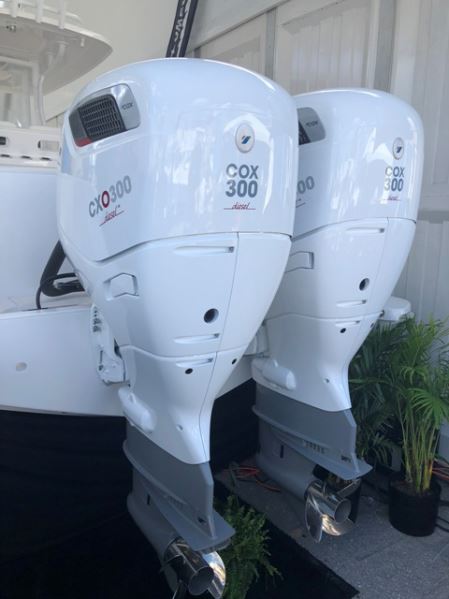 Cox Marine, a UK-based company, unvieled at the Fort Lauderdale International Boat Show last week that it is bringing professional diesel outboards to the U.S. for the first time. “We’ll be opening the doors to our distributor network in the US for private companies,” said Cox Business Development Manager Joel Reid.
Cox Marine, a UK-based company, unvieled at the Fort Lauderdale International Boat Show last week that it is bringing professional diesel outboards to the U.S. for the first time. “We’ll be opening the doors to our distributor network in the US for private companies,” said Cox Business Development Manager Joel Reid.
“Basically, all outboards are designed for recreational boaters,” described Reid, “but professional users have different needs.” Reid estimated that recreational boats are humming for about 100 plus hours every year, but that figure is about 1/10 of the time a professional boat spends on the water.
Cox’s diesel engine boasts 300 high-power density and weighs the same as a gas-powered engine, with increased torque (550 Nm) and three times the longevity. While recreational boats are on the water approximately 100 hours a year, professional outboard-powered boats can easily do ten times that estimate.
Diesel inboard power centers such as Yanmar and Volvo Penta are “already very familiar with diesel engines and consumers,” said Reid. “Through them, we’ve been able to have talks with boat builders. Although the recreational boaters weren’t our original market, we’ve had more than a few companies contact us directly, especially to remove the need for two types of fuel onboard.”
Cox began developing its diesel outboards with the military in mind. “We had to invest 100 million into this project to get things up and running,” said Reid. “Five percent of that investment was supplied by the UK Ministry of Defense and in turn, they then put us in contact with the US Navy and Coast Guard. We have test programs in place that will be kicking off this year with them.”
The U.S. military has been transitioning to diesel from gasoline for almost three decades to appease NATO’s single-fuel requirement. “Reliability and durability of diesel is a huge benefit. Cost and availability of diesel in the marine environment is cheaper than on the road, it’s normally the opposite,” explained Reid. “Gasoline-it is so flammable, it becomes extremely expensive to bunker. From a safety perspective, you can’t stock enough of it without incurring huge costs.”
For More Information vist the Cox Marine website.

